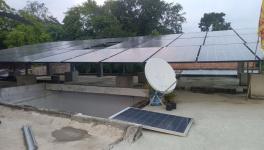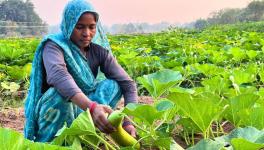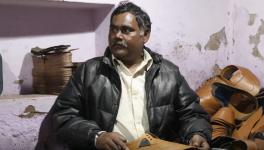Unable to Feed Family for two Days, Farmer Dies by Suicide in Bundelkhand
File Photo.
Lucknow: When 40-year-old Dev Singh hanged himself from a tree on Wednesday in Uttar Pradesh’s Jalaun district, it came as a shock even to local residents of his village in the drought-ravaged Bundelkhand region.
Singh, a native of Kuthonda Buzurg village, was a marginal farmer and was unable to make ends meet to support his wife and five children. They had not eaten for two days prior to his suicide due to the unavailability of ration at home. The family had been pushed to penury, and their only options were to either go hungry or beg for food from neighbours.
Three dry potatoes, half a garlic, and empty grain boxes were kept inside the kutcha house along with an earthen stove, which was not lit for the last two days due to the lack of food grains before Singh died by suicide.
“For the past two days, we have not eaten a thing. I am ill, but there is no money to buy medicine or food. My six-month-old son also has not eaten anything. Due to the lack of money, our financial condition was deteriorating continuously,” Neetu Singh, the deceased’s wife, told NewsClick. She added that the family had been starving for two days, which became unbearable for Singh to see.
In the past few years, most people who died by suicide in the area were either tenants or small-time farmers. However, despite having one bigha of land, Singh could not generate enough income to sustain his six-member family.
Singh reportedly walked into his house after realising his investments were going down the drain, asked his daughter for a pouch of chewing tobacco, bid her goodbye, and went to the farm to end his life.
“He was depending heavily on the crop to repay the loan he had taken from a local moneylender, but was depressed at seeing the prospect of the second crop of the year failing,” said his younger brother Daya Shankar Singh.
Dev is not alone. Such stories of rural distress are strewn across central India’s Bundelkhand region, where farmers are fighting with their backs against the wall after drought, hailstorm, and now an unusual hunger wreaking havoc.
Both the Centre and the state government constantly talk about welfare schemes for the farmers and free ration to the poorest of the poor families across the state. However, Dev Singh’s death tells of a different reality.
Dev Singh’s bank account is in the Aryavart Bank of Jalaun. Till May 18, Rs 3,546 was deposited in the account. On May 19, he withdrew Rs 3,000 for a function when his son turned six months old. After this, only Rs 546 rupees were left in his account. Due to the lack of money, he could not buy essential commodities; the family members claimed the financial condition was steeply worsening.
Rajesh Kumar Singh, the deputy collector of Jalaun, has ordered an investigation into the incident by sending a Lekhpal. Singh said, “The information regarding no food at his house is being probed by the Lekhpal and compensation will be announced after the final report.”
SERIES OF SUICIDES
Last month, a debt-ridden farmer in Banda district died by suicide by jumping in front of a speeding train, the police said.
Worried over the repayment of loans and unnecessary harassment by moneylenders, Garibada Da, 50, a resident of Majra Naiduniya Dera of village Khan Khambhora under Atarra police station, jumped before the train.
According to the family members, he had taken some amount from the local moneylender for farming a few years ago but had not been able to repay it due to a bad harvest, the police said. The family said the moneylender often threatened him about taking away his house if he did not repay the loan.
Garibada had been under pressure ever since and died by suicide by jumping in front of a train, the family added.
With his daughter’s wedding around the corner and no arrangement of funds for dowry, another distraught landless farmer died by suicide at Jhandupurwa village in the Atarra block on April 29.
Moolchandra, a 50-year-old Dalit farmer, ended his life by consuming a poisonous substance. According to his family, Moolchandra did not own land and used to do farming by taking the fields of others on share. The sharecropper used to work as a labourer on the side. With his earnings, he used to support three daughters and one son. Moolchandra did not have money for the marriage of his elder daughter. As the daughter’s marriage procession was to come on June 7, he tried to arrange for funds, but he did not succeed.
Raja Bhaiya, a local activist who documents the deaths of farmers in the region, told NewsClick that most households sold assets to make ends meet. Hundreds of farmer suicides due to starvation and debt abound in the Bundelkhand region, he said.
“The situation post the Covid-19 pandemic has worsened in the Bundelkhand region. Those eligible for rations are not getting it due to a lack of ration cards as most of the people migrated to the big cities in search of jobs. Getting a ration card is an uphill task for them as they live in the cities,” Raja Bhaiya said, adding that “at least 15 debt-ridden farmers have committed suicide in three months in Banda district alone. All were in the trap of debt.”
Get the latest reports & analysis with people's perspective on Protests, movements & deep analytical videos, discussions of the current affairs in your Telegram app. Subscribe to NewsClick's Telegram channel & get Real-Time updates on stories, as they get published on our website.
























